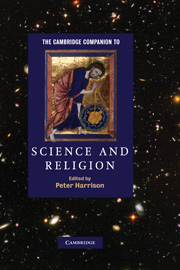Book contents
- Frontmatter
- Introduction
- Part I Historical interactions
- 1 The fate of science in patristic and medieval Christendom
- 2 Religion and the Scientific Revolution
- 3 Natural theology and the sciences
- 4 Religious reactions to Darwin
- 5 Science and secularization
- Part II Religion and contemporary science
- Part III Philosophical perspectives
- A guide to further reading
- Index
4 - Religious reactions to Darwin
from Part I - Historical interactions
Published online by Cambridge University Press: 28 July 2010
- Frontmatter
- Introduction
- Part I Historical interactions
- 1 The fate of science in patristic and medieval Christendom
- 2 Religion and the Scientific Revolution
- 3 Natural theology and the sciences
- 4 Religious reactions to Darwin
- 5 Science and secularization
- Part II Religion and contemporary science
- Part III Philosophical perspectives
- A guide to further reading
- Index
Summary
In 1896 Andrew Dickson White (1832-1918), author of the infl uential A History of the Warfare of Science with Theology in Christendom (1896), suggested that Charles Darwin's Origin of Species had entered the theological arena 'like a plough into an ant-hill'. As was so often the case when he assessed the impact of science on theology, White exaggerated when he alleged that Darwin's theory 'rudely awakened' believers from a lethargic state of 'comfort and repose'. Still, it is unquestionably true that from the outset of its publication in November 1859, Darwin's work elicited much attention and generated more than a little hostility. Religious thinkers in Great Britain and the United States, who serve as the subjects of this chapter, initially charged that in rejecting the interpretation of the history of life as a succession of independent creations of species in favour of a theory predicated on 'random' variation and natural selection, the Darwinian hypothesis challenged the idea that natural history was the realization of a plan initiated and sustained by a providential deity and undermined the veracity of the scriptural depiction of the scheme of redemption. Although some of those thinkers felt compelled to alter their views after it became apparent that most natural historians had embraced the transmutation hypothesis, others continued to regard that hypothesis as a fundamental assault on both natural theology and biblical revelation. By 1920, the chronological endpoint of this chapter, the theory of evolution had become the most theologically controversial scientifi c hypothesis since the time of Galileo.
- Type
- Chapter
- Information
- The Cambridge Companion to Science and Religion , pp. 80 - 102Publisher: Cambridge University PressPrint publication year: 2010
- 2
- Cited by



